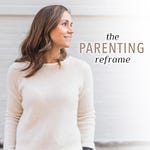In this solo episode, I’m talking about the three things that are an absolute must to know about emotion regulation. It can be challenging to parent a child who has big emotional reactions when things don’t go their way and I know the frustration that can build over time. I really want to talk about this topic to help parents who are experiencing this challenge within their parenting journeys and provide some insight into how you can make things easier for yourself. Here are the three parts of emotional regulation everyone needs to know and understand:
1. What does your regulation look like?
Emotional dysregulation is really simple - it’s when your child can’t tolerate the emotional response that occurs.
There’s nothing wrong with your child when they have a big emotional reaction to something.
Your ability to regulate your own emotions as a parent while your child is dysregulated is incredibly important for managing the situation.
Using PARR when your child starts to have an emotional reaction so that you can stay grounded and calm and co-regulate your own emotions.
2. Self regulation is a skill kids need to learn.
Self regulation is a skill and something that needs to be taught. It’s not something kids inherently have within them.
It’s not realistic or fair to expect kids to be happy all the time.
We often place our value as a parent on how happy our kids are but this can be a harmful cycle for both you and your kids.
Giving your children the tools they need to self regulate is important, especially the older they get.
3. You need a plan.
Dealing with strong willed children can feel unpredictable and like nothing works to change the situation or make it better.
Every time a child has a big reaction, we might change the way we handle the situation (yelling, being silent, escalating the situation, etc.).
Kids seek out predictability to help them feel more comfortable and in control in these situations.
When you have a plan, you usually won’t overreact when there is a tantrum or big emotion happening.
Setting a boundary and restating the boundary can help reinforce your choices and allows your child to see consistency.
Emotion Regulation Group Coaching
I’m offering a group coaching program in mid-April all about emotional regulation.
This five-week program includes weekly meetings where I coach about different topics. The final week is a Q+A session to answer all of your questions about emotion regulation.
You get real-time access to me via Voxer during the five weeks to ask questions and seek advice.
The group is limited to 10 people to ensure I can have a great connection with each person in the group.
Resources:
Sign up for the Emotion Regulation Group Coaching waitlist: https://stan.store/theparentingreframe
Sign up for a FREE 20 minute discovery call: https://stan.store/theparentingreframe/p/free-discovery-call-ck6qf
Be sure to sign up for my Substack newsletter for longer and more specialized parenting content: https://albiona.substack.com/
I hope you found this episode helpful; for more parenting tips, check out my website and blog for more information.
https://theparentingreframe.com/
Follow me on Instagram: https://www.instagram.com/theparentingreframe/
Follow me on TikTok https://www.tiktok.com/@theparentingreframe







All About Emotion Regulation